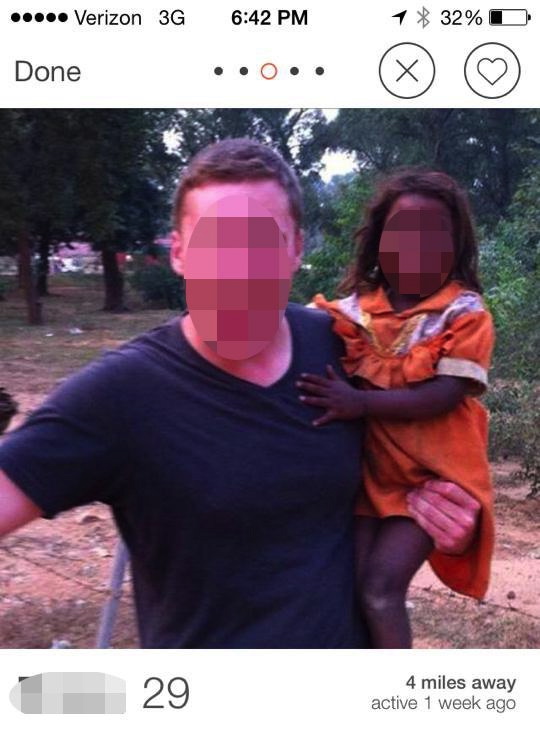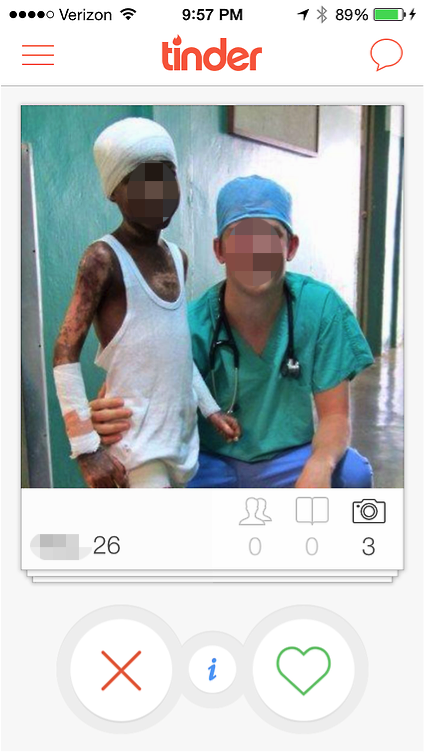This is a guest post by Silvia Vallejo Nazario, the fourth in a series of seven blog posts from my International Development Communications students at Georgetown University’s Public Relations and Corporate Communications Masters Program.
I’ve always had trouble understanding why people would call themselves do-gooders, humanitarians, or even activists. Maybe it’s because I can’t help but compare it to someone taking pride in how humble they are.
Now, don’t misunderstand me, I actually believe that many of these do-gooders are in it for honest reasons. During our time in our International Development Communications class at Georgetown I’ve had the chance to hear different perspectives from people who are actually part of the current development and aid conversations.
Sometimes I wonder if there’s a small group of people that do it for the recognition or to say it to every person they meet. A great example of the latter group is the Humanitarians of Tinder.
 To be honest, when I first heard about this I saw it as a joke. Then I started to go back to my initial opinion/judgment of these so-called humanitarians, asking myself some of these questions:
To be honest, when I first heard about this I saw it as a joke. Then I started to go back to my initial opinion/judgment of these so-called humanitarians, asking myself some of these questions:
Question #1: Am I the only one that thinks there’s something wrong with this?
The first place I went to when looking for real, honest reactions to Humanitarians of Tinder had to be their Facebook page. I mean, how could I resist? I read through comments after comments focusing on the obvious funny factor of this whole thing – how people could use an experience that should be eye-opening and completely selfless for personal gain. But then, I also found what I was looking for. Some were defending the “humanitarians.”
Other than Facebook, I wanted to see what other articles I could find. I soon came across an interpretation of these caption-less pictures. Liam Matthews, of Nerve.com wrote on the inner dialogue that must be going on when a person uploads one of these photos:
“I’m a good person. Just because I’m white and privileged doesn’t mean I’m not a good person. And I don’t have to apologize for being a good person, either. I went to Africa and Guatemala, and it’s part of my experience, so I can show a picture of me smiling with a gaggle of pantless brown children on my Tinder. It happened. It’s not bragging about how worldly and selfless and kind and humble I am. I just am. I helped. Me and my two soft, weak hands and my pop cultural knowledge did good for those three weeks of my sophomore year winter break. If I saw these pictures on Tinder, I would definitely want to have sex with me.”
Let’s just say I’m glad other people think like me. It’s good to know I’m not the only one.
Question #2: What about the “poor, underserved people” in the pictures? Would they feel comfortable with being on Tinder? Are they being taken advantage of?
They say a picture is worth a thousand words. I say, this picture is worth much more than that.
First, it’s sad to see someone using a moment where this boy is vulnerable (and it’s pretty clear that he must have gone through a traumatic experience) for their personal gain.
Second, I doubt this is what was said before taking the picture:
Good doctor/maybe med student: Hey poor kid, want to take a picture with me?
Injured (assumed poor?) kid: Sure, but only if you use it to find a girl. You look lonely.
And third, the boy is portrayed as a victim and the doctor as his godsend savior.
Question #3: How does it affect public perception about people working in development?
In the end I found myself wondering about the negative effects these photos could have when it comes to public opinion. People who travel and work with different agencies and NGOs in development become ambassadors. They are the ones who go back home and share their experience and spread the word. Are the Humanitarians of Tinder popularizing short-term voluntourism even more?
It also made me wonder that if you work in the global development sector, what would happen if you were to see one of your colleagues on Tinder? Would you wonder about their true motivations? Would you want them working by your side?
I think it’s unfortunate that Humanitarians of Tinder have become so popular, because you will always cross paths with people who are somewhat skeptical about these so-called humanitarians, like me. Let’s just hope that people know that for every “tinder humanitarian” there are 10 aid workers that are actually engaging underprivileged kids without recognition, or a date, as their deepest motivation.
***
Silvia Vallejo Nazario is a full-time graduate student, pursuing her master’s degree in Public Relations and Corporate Communications at Georgetown University.
She previously worked in higher education, engaging students and local communities through content marketing, social media, and video storytelling. She has also worked with the Amazon Conservation Association, where she developed a passion for storytelling, social responsibility, and the environment.
Silvia graduated magna cum laude from Universidad del Sagrado Corazón in San Juan, Puerto Rico, with a B.A. in Communications and Public Relations.


Another recent article here:
“Capturing this image and posting it on the internet is to understand the Other not as a separate person who exists in the context of their own family or community but rather, as a prop, an extra, someone only intelligible in relation to the Western volunteer.” http://thesocietypages.org/socimages/2014/06/18/instragrammingafrica-the-narcissism-of-global-voluntourism/
Pingback: In praise of humanitarians | Mindfulnext